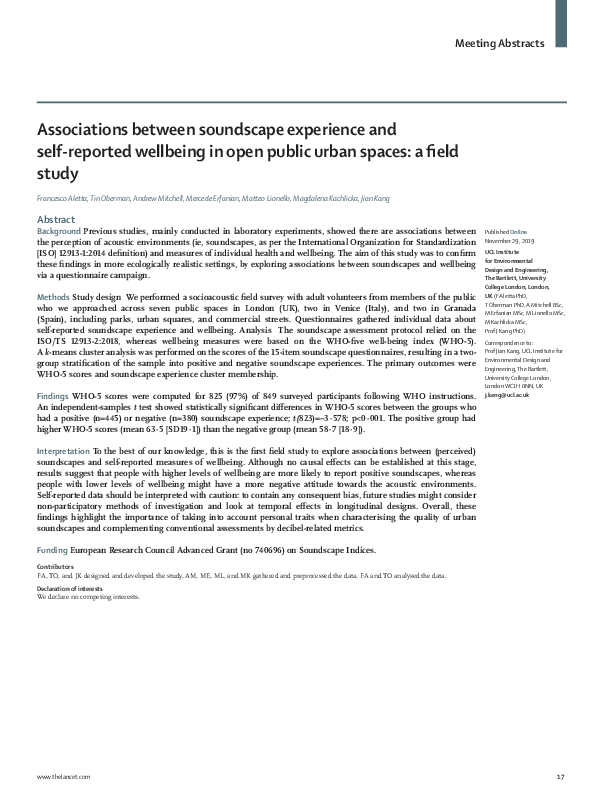Academia.edu no longer supports Internet Explorer.
To browse Academia.edu and the wider internet faster and more securely, please take a few seconds to upgrade your browser.
Associations between soundscape experience and self-reported wellbeing in open public urban spaces: a field study
Associations between soundscape experience and self-reported wellbeing in open public urban spaces: a field study
2019, The Lancet
Related Papers
2016 •
The Swedish Soundscape-Quality Protocol (SSQP) is a tool developed to evaluate and classify acoustic environments according to their acoustic perception by people. This protocol has been proposed by Axelsson, Nilsson and Berglund and it is based on a pleasantness-eventfulness principal component model. This model is feed by qualitative measurements of the extension of eight attributes of Soundscapes and allows one to classify the acoustic environments in four Cartesian quadrants: exciting, chaotic, monotonous, and calm. In the present work, the SSQP is applied in urban environments in four cities: Córdoba and Rosario (Argentina), Valdivia (Chile) and Lund (Sweden). The protocol was evaluated through 509 surveys conducted in 122 locations corresponding to 29 open public environments in these four cities. The evaluated environments included parks, squares, streets, avenues, pedestrian streets, cultural spaces, fountains and other recreational facilities. Results show that most urban p...
2020 •
Soundscape studies aim to consider the holistic human perception of a sound environment, including both the physical phenomena and how these are mediated by internal factors: the mechanisms underpinning the interactions between these two aspects are not well understood. This study aims to assess the influence of psychological well-being and demographic factors including age, gender, occupation status, and education levels on the dimensions of the soundscape circumplex, i.e., Pleasantness and Eventfulness. Data was collected in eleven urban locations in London through a large-scale (N=1134) soundscape survey according to the ISO 12913-2 technical specifications and incorporating the WHO-5 well-being index. Linear mixed-effects modelling applying backwards-step feature selection was used to model the interactions between internal factors including psychological well-being, age, gender, occupation status, education levels and the soundscape Pleasantness and Eventfulness, while accounti...
2013 •
2016 •
Combining surveys with other methods like observations can offer a more holistic understanding of participants’ experience, with respect to activity and the evaluation of acoustic environments. Reconciling data from multiple methods remains a challenge for soundscape research, even in well-studied park settings. We compare 3 methods (behavioral mapping (n=84), questionnaires (n=41), sound recordings) to research the interaction between park users and their soundscapes over 4 sessions in the summertime. We collected soundscape ratings (SSQP, restorativeness, appropriateness) and free-format verbal descriptions, together with demographics, activity data, and personality measures. Annotated sound recordings for each observation session were compared against source and activity descriptions and free format verbal descriptors were classified into emerging themes. Within categories of sound sources, we observed different valences (e.g. within bird sounds, ducks were positive, seagulls neg...
2016 •
The overall aim of this research was to find a group of easy-to-access variables, that are measurable or assessable, and which help predict acoustic comfort in urban places, in order to make further progress in developing a soundscape indicator based on indices readily available in urban environments. Our main conceptual framework has been the Environmental Experience Model and the ISO of Soundscape, together with the most up-to-date information and technology, where parameters that influence the soundscape and comfort in urban public places have been identified. This work has been undertaken as part of the CITI-SENSE project. A viable technical and procedural solutionwas designed and tested in a field demonstration, where 53 people were engaged to provide 120 observations in the city ofVitoria-Gasteiz, using environmental sensors connected to a smartphone. The results were analysed and are discussed here with the aim of defining an indicator that permits an easy evaluation of acous...
Background. Wellbeing issues are increasingly incorporated within conservation biology and environmental sciences, both in academic research and in applied policies such as the global sustainable development plans. The role of landscape on human wellbeing has been widely reported, but a comprehensive understanding of the role of soundscape has yet to be explicated. Research on the influences of sound on wellbeing has been conducted across a range of disciplines, but integration of findings is impeded by linguistic and cultural differences across disciplinary boundaries. This study presents the largest systematic literature review (2499 publications) of research to date, addressing the association between soundscape and human/ecological wellbeing. Method. It is divided in two components: 1. rapid visualisation of publication metrics using the software VOS Viewer, and 2. analysis of the categories of wellbeing associated with soundscape using the natural language processing platform, ...
RELATED PAPERS
Proceedings of SPIE
Random walk based segmentation for the prostate on 3D transrectal ultrasound images2016 •
2012 •
Scriptura Sacra
J. Jaromin, Wartość królestwa Bożego w przypowieściach Ewangelii synoptycznych. Studium lingwistyczno-egzegetyczne2014 •
Journal of Marine Technology and Environment
The Green Shipping. Study on Regulations and Sustainable Options for DecarbonisationGondwana Research
Oceanic lithosphere and ophiolites: Birth, life and final resting place of related ore deposits2020 •
Materials Today: Proceedings
Electrokinetic restoration of local saline soil2019 •
International Journal of Medical Science and Public Health
Nutritional status of elderly people using Mini Nutritional Assessment tool in an urban slum of Hyderabad2018 •
Child's Nervous System
HydroCoil embolization of a ruptured infectious aneurysm in a pediatric patient: case report and review of the literature2006 •
Mathematical Problems in Engineering
Well-Conditioning Map for Tensor Spectral Solutions for Eigenvalues in 2D Irregular Planar DomainsRELATED TOPICS
- Find new research papers in:
- Physics
- Chemistry
- Biology
- Health Sciences
- Ecology
- Earth Sciences
- Cognitive Science
- Mathematics
- Computer Science

 Mercede Erfanian
Mercede Erfanian